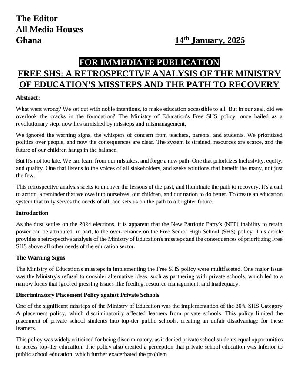
GNACOPS, the Ghana National Council of Private Schools, has blasted the Ministry of Education (MoE) for its management of the Free Senior High School (SHS) policy, claiming that the program's issues were made worse by the autocratic leadership style and the refusal to consider different perspectives.

Obenfo Nana Kwasi Gyetuah, National Executive Director of GNACOPS, clarified that the Ministry's failure to address fundamental problems in the education system and the NPP's over reliance on Free SHS were two factors that contributed to the party's failure to hold onto power in the 2024 elections.
In a thorough report issued on January 14, GNACOPS detailed a number of errors committed by the Ministry and highlighted a number of reasons why the policy didn't work. The Ministry's reluctance to consider alternate options, like collaborations with private schools, meant that urgent problems like infrastructure, food, and resource distribution went unaddressed.
One particularly contentious ruling was the 30% SHS Category A placement regulation, which restricted private school pupils' access to prestigious public institutions, so discriminating against them. The goal of the program, which was to provide equal access to high-quality education, was further damaged when it was heavily condemned for dividing pupils attending public and private schools.
The Ministry was also accused of being dishonest and unscrupulous in the student placement process, since party supporters were appointed to important roles, creating a climate of suspicion and partiality.
According to GNACOPS, the Ministry's leadership style is dictatorial and haughty, suppressing any criticism or comments from parents, teachers, and school administrators. Limiting stakeholder input simply made the policy's detrimental effects worse.
Another big worry was the misallocation of resources. At the expense of textbooks and other necessary educational resources, the Ministry prioritized expensive infrastructure projects in specific constituencies due to political motivations. In order to prioritize secondary education that could forward political agendas, the Ministry neglected primary schools, leaving them in appalling circumstances, according to GNACOPS.
The selection of inexperienced leaders and the inability to properly engage with the public were also questioned. The Ministry's shortcomings in digital communication were highlighted by GNACOPS, since official websites and social media platforms were regularly unavailable, eroding openness and confidence.